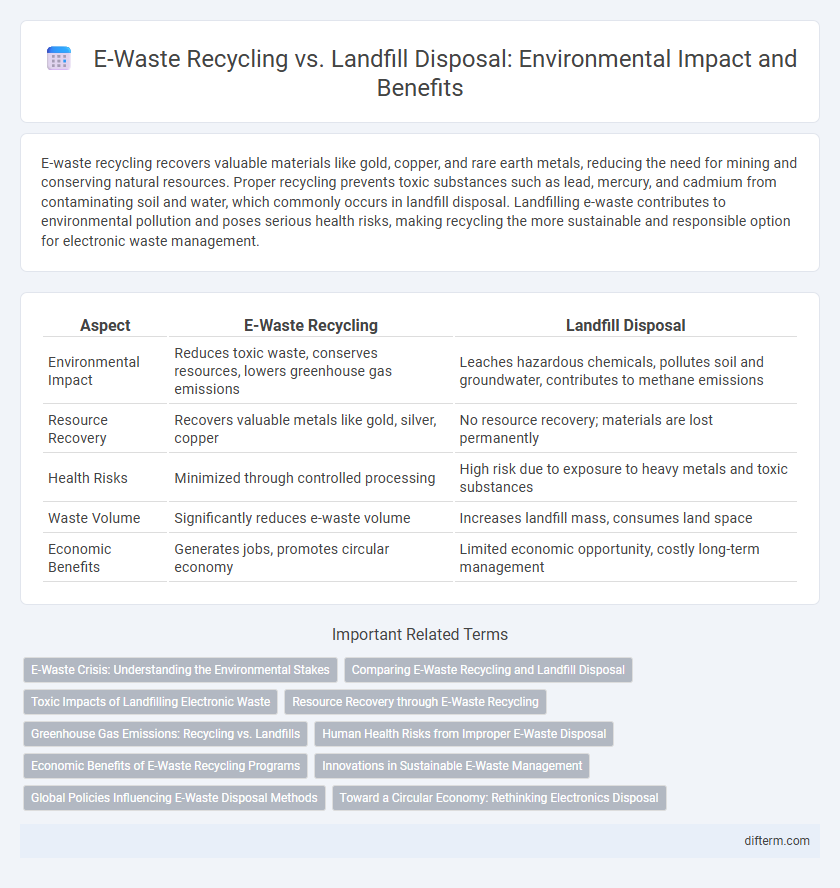E-waste recycling recovers valuable materials like gold, copper, and rare earth metals, reducing the need for mining and conserving natural resources. Proper recycling prevents toxic substances such as lead, mercury, and cadmium from contaminating soil and water, which commonly occurs in landfill disposal. Landfilling e-waste contributes to environmental pollution and poses serious health risks, making recycling the more sustainable and responsible option for electronic waste management.
Table of Comparison
| Aspect | E-Waste Recycling | Landfill Disposal |
|---|---|---|
| Environmental Impact | Reduces toxic waste, conserves resources, lowers greenhouse gas emissions | Leaches hazardous chemicals, pollutes soil and groundwater, contributes to methane emissions |
| Resource Recovery | Recovers valuable metals like gold, silver, copper | No resource recovery; materials are lost permanently |
| Health Risks | Minimized through controlled processing | High risk due to exposure to heavy metals and toxic substances |
| Waste Volume | Significantly reduces e-waste volume | Increases landfill mass, consumes land space |
| Economic Benefits | Generates jobs, promotes circular economy | Limited economic opportunity, costly long-term management |
E-Waste Crisis: Understanding the Environmental Stakes
E-waste recycling significantly reduces toxic chemicals such as lead, mercury, and cadmium from contaminating soil and groundwater compared to landfill disposal, which often results in hazardous leachate. Recycling recovers valuable metals like gold, silver, and copper, decreasing the demand for virgin mining and lowering greenhouse gas emissions. Efficient e-waste management mitigates harmful environmental impacts and advances sustainable material use.
Comparing E-Waste Recycling and Landfill Disposal
E-waste recycling recovers valuable metals such as gold, silver, and copper, reducing the demand for virgin mining and conserving natural resources. Landfill disposal, on the other hand, leads to hazardous chemical leaching, including lead and mercury, which contaminate soil and groundwater. Recycling e-waste significantly lowers environmental pollution and greenhouse gas emissions compared to landfill dumping.
Toxic Impacts of Landfilling Electronic Waste
Landfilling electronic waste releases hazardous substances like lead, mercury, and cadmium into soil and groundwater, posing severe risks to ecosystems and human health. Toxic chemicals leach from decomposing e-waste, contaminating drinking water sources and causing bioaccumulation in wildlife. Recycling e-waste mitigates these dangers by safely recovering valuable materials and preventing environmental pollution.
Resource Recovery through E-Waste Recycling
E-waste recycling significantly enhances resource recovery by extracting valuable metals like gold, silver, and copper from discarded electronics, reducing the need for virgin material mining. Landfill disposal contributes to the loss of recoverable resources and poses environmental hazards through toxic leachates. Advanced recycling technologies improve material reclamation rates, promoting sustainable resource management and minimizing ecological impact.
Greenhouse Gas Emissions: Recycling vs. Landfills
Recycling e-waste significantly reduces greenhouse gas emissions compared to landfill disposal by preventing the release of methane, a potent greenhouse gas produced during organic waste decomposition in landfills. Recovering valuable metals through recycling decreases the need for energy-intensive mining and manufacturing processes, further lowering carbon dioxide emissions. Efficient e-waste recycling programs contribute to mitigating climate change by minimizing the environmental footprint associated with electronic waste management.
Human Health Risks from Improper E-Waste Disposal
Improper e-waste disposal in landfills releases toxic substances such as lead, mercury, and cadmium, which contaminate soil and groundwater, posing severe health risks including neurological damage and respiratory issues. E-waste recycling, when conducted properly, mitigates exposure to hazardous chemicals and reduces environmental pollution, protecting communities from harmful effects. Increased global e-waste generation demands efficient recycling systems to prevent the escalation of human health hazards linked to toxic waste leachate and air pollution from burning e-waste.
Economic Benefits of E-Waste Recycling Programs
E-waste recycling programs generate significant economic benefits by recovering valuable metals such as gold, silver, and copper, reducing the need for costly mining operations. These programs create green jobs in collection, processing, and resale industries, stimulating local economies and promoting sustainable growth. Diverting e-waste from landfills also minimizes environmental cleanup costs associated with hazardous material leakage, translating into long-term financial savings for communities.
Innovations in Sustainable E-Waste Management
Innovations in sustainable e-waste management include advanced technologies such as robotic disassembly, AI-driven sorting systems, and chemical recovery processes that enhance material reclamation efficiency. These methods significantly reduce environmental impact compared to traditional landfill disposal by minimizing toxic waste and promoting circular economy principles. Enhanced recycling infrastructure and smart logistics contribute to higher recovery rates of precious metals like gold, silver, and palladium, supporting resource conservation and waste reduction.
Global Policies Influencing E-Waste Disposal Methods
Global policies such as the Basel Convention and the European Union's Waste Electrical and Electronic Equipment (WEEE) Directive have significantly influenced e-waste disposal methods by promoting environmentally sound recycling practices over landfill disposal. These regulations mandate the proper collection, treatment, and recovery of hazardous materials in e-waste, reducing toxic leachate and soil contamination associated with landfills. Countries adopting strict e-waste management policies report higher recycling rates and decreased environmental pollution compared to regions relying primarily on landfill disposal.
Toward a Circular Economy: Rethinking Electronics Disposal
E-waste recycling recovers valuable materials like gold, copper, and rare earth elements, significantly reducing the need for virgin resource extraction and minimizing hazardous waste in landfills. Landfill disposal of electronics leads to toxic chemical leaching, polluting soil and groundwater while contributing to resource depletion and environmental degradation. Embracing a circular economy approach in electronics disposal promotes product longevity, material recovery, and sustainable manufacturing, ultimately reducing environmental impact and fostering responsible resource management.
e-waste recycling vs landfill disposal Infographic

 difterm.com
difterm.com